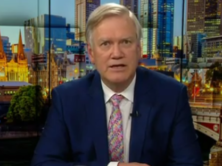Indian journalist Barkha Dutt defended herself after Open and Outlook magazines published transcripts of her talking with a lobbyist. (credit: NDTV)
iMediaEthics wrote last month about the media scandal in India in which two top journalists were accused of crossing ethical lines.
SiFy.com referred to the scandal as “India’s own WikiLeaks.”
Leaked tapes implicated two top Indian journalists – Barkha Dutt and Vir Sanghvi – by suggesting they helped lobbyist Niira Radia gain access to political connections and stage interviews. The Hindu’s Vida Subrahmaniam referred to the tapes as an “awakening moment for journalists” and a “stunning indictment of the media, or at least sections of it.”
Recently, Open magazine, one of the two news outlets that broke the story and the taped conversations, defended itself for publishing the tape’s transcripts. The magazine published without seeking comment from Dutt and others implicated in the scandal prior to publication, the Wall Street Journal’s “Real Time India” blog noted.
Open’s editor, Manu Joseph, stood by the decision to not contact for prior comment. “Real Time India” reported that Joseph explained that by contacting the journalists on the tapes as well as the other recorded individuals — “politicians and businessmen” — the story could have been quashed. Joseph stated:
“We could not afford to take that risk and took the extraordinary decision to run the transcripts without seeking their comments. It is also important to note that we did not chop the transcripts mid-way or present half conversations. We did omit some sets of conversations because they did not have any editorial value.”
Joseph noted that Dutt “has had a very cordial relationship” with Open and that the magazine has “professional respect” for both Dutt and Sanghvi. However, that didn’t come into play when deciding to publish. “Never did we debate whether we wanted to carry this story,” Joseph is quoted as saying. “The whole focus was on how.”
Now, Dutt, who is called the Indian Oprah Winfrey, has also spoken out defending herself in the scandal.
Sanghvi is a columnist for the Hindustan Times.
The New York Times wrote that, as a result of the published records, Barkha Dutt has transitioned from the interviewer role to being in the hot seat herself. “I look at some of the conversations, and I do feel I should have been more alert,” Dutt is quoted as saying in an interview. “I should have been more skeptical. I should have known better.”
However, Dutt explained that she thinks she ended up being the scapegoat for all of India’s media ethics problems.
“At a moment when the public gets anxious about the state of the Indian media, I am suddenly made to answer for everybody else,” she is quoted as saying.
As the Times noted, Dutt is only on “a tiny fraction of the recordings.” However, she has come under fire for not having a keen news nose.
“Dutt has been criticized for failing to recognize that the mere fact that a corporate lobbyist was so deeply involved in trying to get a particular person named to a cabinet post was a story in itself. The lobbyist was trying to persuade the government to reappoint Andimuthu Raja, the politician at the center of a telecommunications scandal that may have cost the Indian government as much as $40 billion.”
Media critic Mannika Chopra explained in the Times report that reporters “are so eager to get that one bite, so they overlook the big picture.”
The Hindu’s Vida Subrahmaniam criticized Dutt for not apologizing or showing “remorse” for what she said on the tapes.
The BBC reported that Rajdeep Sardesai, the editor of the TV channel CNN-Ibn, believes that problems in India’s media ethics aren’t a new issue.
“This rot is not new – it’s been around for three decades at least,” Sardesai is quoted as saying.
“In this competitive age, access is information which is where the politicians have co-opted the journalists. Corporate India and politicians are subverting the system,” he said.
“It’s very, very disappointing. Neither of them is corrupt, nobody is saying they are corrupt. But corruption when it involves ethics is worse then taking money,” senior political journalist Tavleen Singh is quoted as telling CNN.






Comments Terms and Conditions